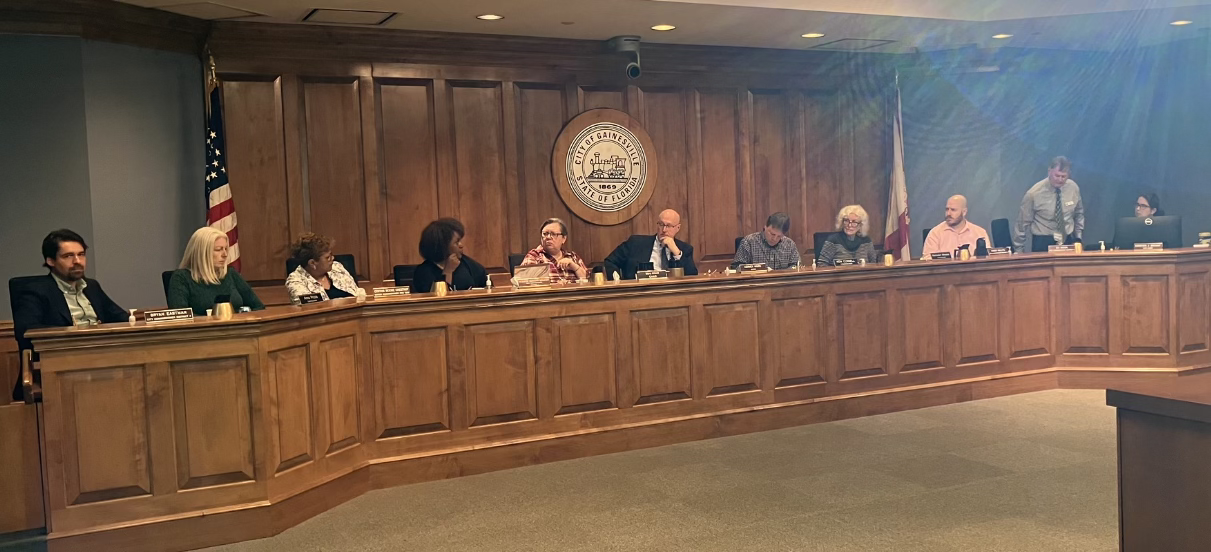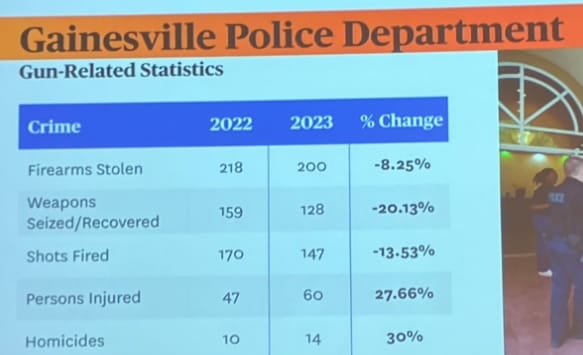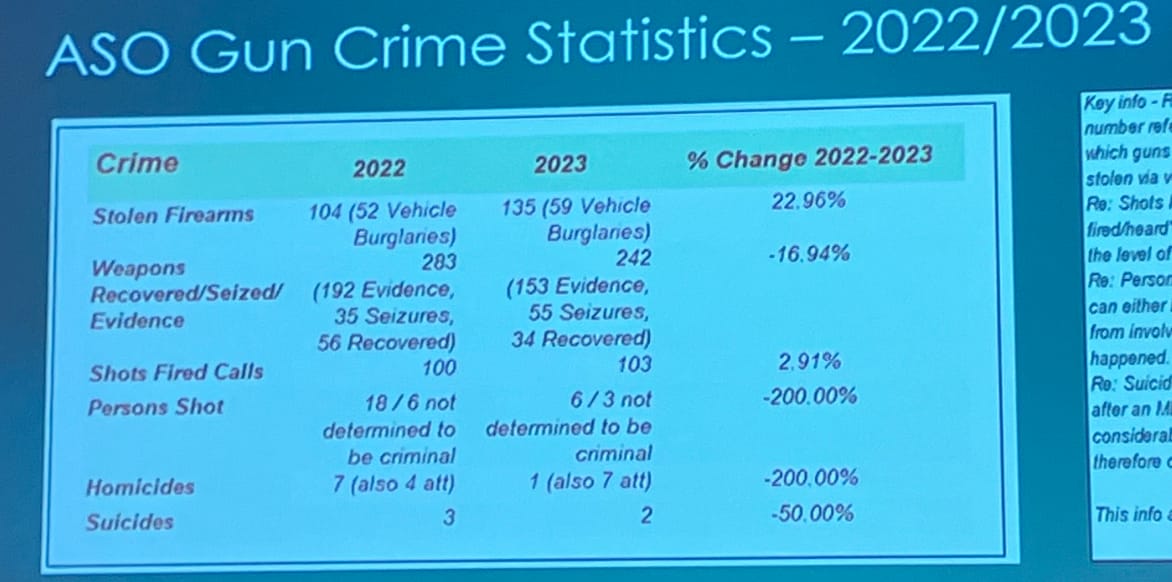“Places To Go, Things To Do, Mentors, Jobs.” Alachua & Gainesville Commissioners Discuss Solutions to Local Gun Violence

“Places to go, things to do, mentors, jobs.” These were the solutions repeated by Gainesville City Commissioner Desmon Duncan-Walker and echoed by Alachua County Commissioner Anna Prizzia at Monday’s city/county joint commission meeting.
Last July, gun violence was declared a public health crisis in Gainesville. As a response, the Gainesville Police Department (GPD) and Gainesville Fire and Rescue (GFR) developed a gun violence prevention initiative, which they gave an update on yesterday.

GFR Community Health Director Brandy Stone detailed the initiative’s community outreach, saying law enforcement officers have gone into neighborhoods that are determined to be at risk of gun violence and knock on residents’ doors in full police uniform. This sparked debate between Prizzia and assistant/soon-to-be interim chief of GPD, Nelson Moya.
Prizzia argued that officers knocking on doors in full uniform sends the wrong message.
“I think that for many people in those neighborhoods, a cop showing up at their door can be a pretty traumatic experience in itself. The stigma... the whispers. The community attention it brings might be the opposite of what we’re trying to do… Since this isn’t about enforcement and just community outreach, if we could ask the officers to go out plain-clothed during those visits?"
Moya agreed that Prizzia had a point but argued community members need to see officers in uniform to build better relationships with them.
“To your point, ma’am, in terms of what we look like out there, yeah, open for discussion. One side says we should be identified so people can start building relationships with us. If there is in fact a gap in trust, we want to bridge that, and you can only do that if you know who I am and what I stand for… We just launched it a few weeks ago, and it has yielded very successful experiences for us in terms of dialogue.”
County Commissioner Marihelen Wheeler suggested engaging with gun store owners.
This prompted Moya to step back up to the stand and say GPD had already increased security measures at one gun store, but that GPD’s main focus is illegally acquired weapons.
Moya emphasized the need for a focus on youth due to an increase in gun violence involving juveniles, saying that parents have a responsibility to know what's in their children’s belongings.
Wheeler added that she heard there was a recent resurgence of “gang activity” at Westward Middle School.
Moya said law enforcement agencies are generally careful about using the word “gang” but did admit “select neighborhoods certainly have issues with one another,” detailing that lines can be thin, saying, “You may see a sect of a neighborhood that has an issue with this other neighborhood, but then we also see an alliance there a week later.”
Alachua County Sheriff Emery Gainey said, “These are neighborhood gangs by Florida definition, without a doubt,” slightly disputing Moya’s take on the situation but also acknowledging that they aren’t the types of gangs people traditionally think of.

Prizzia acknowledged that gun violence isn't just being committed by minors and that shootings are often perpetuated by repeat offenders, citing a need for stronger rehabilitation programs. She said the presentation should be less reiteration of what the city has already been doing and more planning for the future.
Mayor Harvey Ward offered a defense to her comments.
“Those words represent thousands of hours of effort on behalf of hundreds of individuals who work for the city of Gainesville. I get the point. I do believe me. We’re all working as hard as we can to find solutions. Sometimes the solutions are to keep doing what you’re doing over an extended period of time and not necessarily chasing whatever's next.”
As he has previously done, Ward argued the problems stem from the physical guns themselves and argued a large part of the gun violence epidemic in Gainesville stems from Fl state statutes preventing local governments from passing laws related to firearms.
Prizzia said she wasn’t trying to disparage staff at the City of Gainesville, but that when she read about programs described as “a range of activities such as mentorship opportunities, job training, educational opportunities, and social services,” she wanted to know what they specifically entailed to find the gaps within them.
Stone mentioned hearing solutions from local youth who had been affected by gun violence through the One Nation One Project and acknowledged a variety of gun violence prevention programs, including the Black on Black Crime Task Force.
Deputy County Manager Carl Smart said the Black on Black Crime Task Force has voted and agreed to set up a sub-group to focus on gun violence, which will include authorities and officers from different law enforcement agencies around the county.
Duncan-Walker criticized Smart for voicing approval of a task force centered on African Americans.
“My concern is that doing it under the umbrella of the Black on Black crime task force sends a particular racialized message to individuals who are not Black and are also impacted by gun violence.”
Smart argued that the task force has been around for a long time, since 1998.
Duncan-Walker replied with her proposed solutions based on what impacted parties have told her.
“Places to go, things to do, mentors, jobs. That’s what the kids say. That’s what their parents say… That's what I’ve been reiterating from the time I’ve sat in this seat.”
Duncan-Walker went on to defend the impact of cultural arts initiatives, saying that when she previously brought up the notion of building a cultural arts center in East Gainesville, people questioned if it would work.
"Some people were like, 'Oh my goodness, a cultural arts center, how is that going to address gun violence?' A place to go with things to do, where there'll be mentors and jobs. It is a long-range goal, but it is something I've seen and something I've been privileged enough to be a part of, watching it save lives."
Duncan-Walker held the same sentiment on the topic of rehabilitation programs.
“There are individuals who have paid their debt to society for violent crime and who have come back into our communities... All of them need resources and ways to reenter. [Places to go,] things to do, [mentors,] jobs, let that be the mantra.”
Prizzia reiterated the need for rehabilitation programs to prevent reoffence.
“If we have not set up a program for those people, when they come back, they are going to commit crimes again. They get $50 when they get out of jail, maybe. They don’t even get transportation… They get released at 2:00 or 4:00 in the morning… They’re out there in the middle of the night with no bus ticket, no money, and right by [homeless shelter] Grace Marketplace. Guess what the first thing they’re gonna probably do is: figure out a way to make some cash, go score some drugs, and sell them... If we don’t provide opportunities for people, guns and crime become opportunities for people.”
County Commissioner Ken Cornell said he agrees with Prizzia’s sentiment but that if someone picks up a gun, he’s “done,” saying, “They can’t do that in this community if we have the technology to prevent gun violence.” Cornell made a motion to approve an allocation of $150,000 from their American Resuce Act Plan (ARPA) funds toward gun violence initiatives.
Prizzia questioned how $150,000 would be allocated, with the city recently putting $150,000 towards gun violence prevention programs from their ARPA funds.
Ward pointed out that the city has less money than the county, and thus $150,000 would be worth less to them comparatively.
Cornell’s motion passed 4-0 with a note to have staff bring back a recommendation during the budget cycle. Several commissioners left the meeting early.
During public comment, Kali Blount agreed with Duncan-Walker and Prizzia's proposed solutions, comparing the actions by the current task force to “moving deck chairs on the Titanic.”




